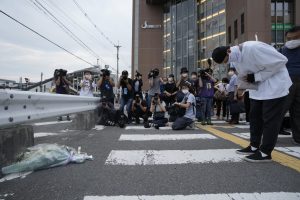On the eve of Japan’s upper house election, former Prime Minister Abe Shinzo was shot and killed while giving a public speech for a ruling Liberal Democratic Party (LDP) candidate in the western city of Nara, Japan. According to Japanese media, Abe, 67, was shot twice in the back with a “handmade” shotgun and lost consciousness in the ambulance. He was pronounced dead shortly after 5 p.m., local time.
The suspect, who is in police custody, is believed to be a former Japan Self-Defense Forces member who was allegedly “dissatisfied” with Abe.
The attack, just two days before polls open, has sent shockwaves running through Japan, a country that has earned a reputation for low crime and peaceful elections. Mourners have begun to lay flowers at the site of the attack.
World leaders reacted to the attack on social media. U.S. President Joe Biden, Britain’s Prime Minister Boris Johnson, India’s Prime Minister Narendra Modi, and German Chancellor Olaf Scholz also expressed their condolences.
In a televised press conference Prime Minister Kishida Fumio condemned the attack as “barbaric and malicious,” saying it “cannot be tolerated.”
Abe’s former foreign minister, Kono Taro, tweeted that the “LDP will not be deterred by violence and will continue its election campaign until the end.”
The attack has sparked anxiety over public safety as residents head to the polls over the weekend. There are also concerns over the lack of protection for political candidates on the campaign trail. In Japan security at campaign events is virtually non-existent – as are incidents of gun violence, especially compared to the United States. Abe is believed to have had a security detail present, which failed to prevent the attack.
Abe holds the title as Japan’s longest-serving prime minister. After eight consecutive years in the post, he stepped down in the midst of the global COVID-19 pandemic, citing worsening health in August 2020. Abe was succeeded first by close ally Suga Yoshihide and then by Kishida in October last year. Abe has remained a prominent member of the ruling LDP and held considerable influence, even after his resignation.
Under Abe’s leadership between 2012 and 2020, Japan’s unemployment rate fell to its lowest level in decades. He is also credited for adding some 2 million women to the labor force and used the funds from the consumption tax hike to expand daycare facilities and cover widening gaps in Japan’s social security system.
Gun crime is very rare in Japan. In a population of 126 million there were only 10 incidents of gun related crimes and one recorded death last year. The shooting begs the question as to how concrete policies can be implemented to prevent another such attack, especially since the killer reportedly made his own weapon rather than purchasing one.
Japan already has strict laws on private gun ownership. Civilians are banned from owning guns, but exceptions are made for sport and hunting. Even then, gun ownership involves a rigorous application process that entails 13 steps in total. Applicants must pass a written exam as well as physical and mental health evaluations. They must take lessons on how to use a gun and store it safely. Police also conduct thorough background checks and call family, neighbors, and friends for character references.
Nara is a former ancient capital of Japan, and its mountainous rural landscape is home to famous shrines and temples and some 1,300 deer. Before the pandemic it was known as a tourist hotspot, but the shocking assassination of Japan’s most famous politician will inevitably cast a shadow on the usually peaceful town.
































